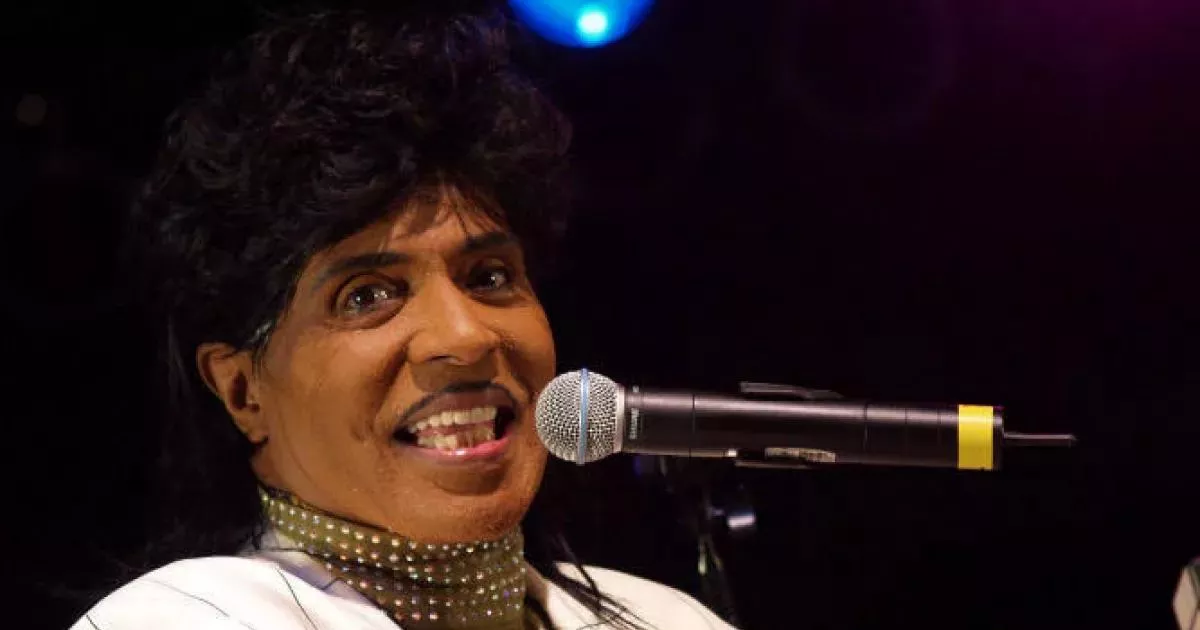Richard Wayne Penniman, known as Little Richard, was a highly influential American musician active for seven decades. His energetic piano playing, strong vocals, and captivating stage presence during the mid-1950s established him as a founding figure of rock and roll, earning him the title "Architect of Rock and Roll." His unique musical style significantly influenced rhythm and blues and shaped genres like soul and funk, impacting musicians across various genres for generations.
December 5, 1932: Birth of Richard Wayne Penniman
Richard Wayne Penniman, later known as Little Richard, was born on December 5, 1932. He would become a highly influential figure in popular music and culture.
October 1947: Discovered by Sister Rosetta Tharpe
At just fourteen years old, Little Richard's talent caught the attention of gospel singer Sister Rosetta Tharpe, who invited him to open her show at the Macon City Auditorium in October 1947. This event proved pivotal in inspiring his pursuit of a musical career.
1949: Joining Doctor Nubillo's Traveling Show
In 1949, Little Richard joined Doctor Nubillo's traveling show, marking an early step in his professional career. It was during this time that he began incorporating flamboyant elements into his performances.
1949: Joining Hudson's Medicine Show and Early R&B Influence
Little Richard joined Hudson's Medicine Show in 1949, where he performed Louis Jordan's "Caldonia," a pivotal song in his early exposure to secular R&B music. Jordan's influence on Richard's musical style was significant.
1950: Little Richard's Recording with the Upsetters
In 1950, back in the United States, Little Richard recorded six rock and roll songs with his 1950's band, the Upsetters for Little Star Records, under the name "World Famous Upsetters", hoping this would keep his options open in maintaining his position as a minister.
1950: Performing in Drag and Joining Buster Brown's Orchestra
Little Richard performed in drag as "Princess LaVonne" and joined Buster Brown's Orchestra in 1950. This period saw him honing his performance skills in various vaudeville acts and immersing himself in the Atlanta club scene.
February 1952: Departure from RCA Victor
After his records failed to gain traction, despite some success in Georgia, Little Richard left RCA Victor in February 1952.
1952: The Passing of Little Richard's Father
In 1952, Little Richard faced a personal loss with the death of his father. This event coincided with some success as RCA Victor reissued some of his recordings.
February 1953: Signing with Peacock Records
Seeking a breakthrough, Little Richard signed with Don Robey's Peacock Records in February 1953. Despite his energetic performances, his singles failed to chart, leading to frustration and eventually, a dispute with Robey.
1953: Pioneering Soul Music
Otis Redding cited Little Richard's 1953 recording "Directly From My Heart To You" as a key inspiration for soul music, acknowledging its influence on him and other soul singers.
1954: Meeting Esquerita and Forming The Upsetters
Returning to Macon in 1954, Little Richard faced financial struggles. However, a pivotal encounter with musician Esquerita heavily influenced his musical style. He formed a new band, The Upsetters, and toured the Southern United States.
February 1955: Demo Sent to Specialty Records
In February 1955, at the suggestion of Lloyd Price, Little Richard sent a demo tape to Specialty Records, hoping for a fresh start.
September 1955: "Tutti Frutti" Recording and Release
In September 1955, Little Richard, guided by producer B.B. Blackwell, transformed his risqué song "Tutti Frutti" into a more radio-friendly version with help from songwriter Dorothy LaBostrie. The song, recorded in just three takes, was released as a single in November 1955 and quickly gained popularity.
1955: "Tutti Frutti" Hits the Charts
In 1955, Little Richard released "Tutti Frutti," a song that quickly became a hit, crossing over to pop charts in the U.S. and the U.K., establishing him as a major force in the emerging rock and roll scene.
1955: Birth of Rock and Roll
In 1955, Little Richard's unique fusion of boogie-woogie, New Orleans R&B, and gospel music helped shape the sound of early rock and roll. His high-energy performances and distinctive vocal style contributed significantly to the genre's identity.
1955: Richard's Arrest for Voyeurism
Richard's involvement in voyeurism in his early twenties led to his arrest in 1955, resulting in a sexual misconduct charge, three days in jail, and a temporary ban from performing in Macon.
June 1956: The Royal Theatre Incident
During a performance at Baltimore's Royal Theatre in June 1956, Little Richard experienced an unprecedented level of fan frenzy. Women in the audience began throwing their undergarments onstage, a gesture widely attributed to his electrifying performance style and suggestive lyrics. The concert was repeatedly interrupted as fans attempted to reach the stage, showcasing the powerful effect of Richard's music and persona on his audience.
September 2, 1956: Performance at the Cavalcade of Jazz
Little Richard graced the stage at the prestigious Cavalcade of Jazz, held at Wrigley Field in Los Angeles, on September 2, 1956. Sharing the stage with renowned artists such as Dinah Washington and Gerald Wilson, Richard's performance was part of a landmark event in jazz and R&B music history.
1956: Rise to Fame and Formation of The Upsetters
Following the success of "Tutti Frutti", Little Richard's career skyrocketed in 1956 with the release of his hit single "Long Tall Sally", which topped the R&B chart. He formed his backup band, The Upsetters, and began touring the United States, captivating audiences with his dynamic and uninhibited performances. His energetic stage presence, characterized by piano acrobatics and flamboyant costumes, became legendary.
1956: Inspiring the Beatles
John Lennon's profound reaction to "Long Tall Sally" in 1956 highlights the impact of Little Richard's music on The Beatles.
1956: "Long Tall Sally" Tops the Charts
Little Richard achieved another milestone in 1956 when "Long Tall Sally" reached No. 1 on the Billboard Rhythm and Blues Best-Sellers chart. This success solidified his place as a leading figure in rock and roll.
1956: "All Around the World" Release
Little Richard released his song "All Around the World" in 1956.
1956: Chart Success and Crossover Appeal
Little Richard's influence on music became undeniable in 1956 as he released seven singles in the United States, with five charting in the UK. His music transcended racial barriers, attracting the attention of white artists who covered his songs, further propelling his fame. Notably, Pat Boone's cover of "Tutti Frutti" reached a higher chart position than Richard's original, highlighting the complexities of race and music industry dynamics at the time. Richard's association with disc jockey Alan Freed led to his inclusion in rock and roll films like "Don't Knock the Rock" and "Mister Rock and Roll", solidifying his place in the emerging genre. He continued to release hits, with "Jenny, Jenny" and "Keep A-Knockin'" becoming major successes.
1956: Richard's Relationship with Audrey Robinson
Richard's involvement with Audrey Robinson, a college student, began around 1956. Their relationship was complex, with Robinson later denying Richard's claims about their intimacy and his proposal.
1956: Influencing Sam Cooke
Sam Cooke's 1963 hit cover of Richard's 1956 song "Send Me Some Loving" further solidified Richard's influence on the development of soul music.
March 1957: Release of Debut Album
Little Richard's debut album, "Here's Little Richard", hit the shelves in March 1957, peaking at number thirteen on the Billboard Top LPs chart. The album featured a mix of his previously released hit singles and additional tracks, following the standard formula for albums during that era.
October 1957: Australian Tour and Spiritual Awakening
In October 1957, Little Richard embarked on a tour of Australia alongside fellow rock and roll pioneers Gene Vincent and Eddie Cochran. However, amidst the tour's success, Richard made a surprising announcement, expressing his intentions to pursue a life dedicated to the ministry. This unexpected declaration shocked his fans and marked a significant shift in his personal and professional life.
October 1957: Richard Meets Ernestine Harvin
Richard met his future wife, Ernestine Harvin, at an evangelical rally in October 1957.
1957: Richard's Return to Religion
After a spiritual awakening in 1957, Richard enrolled at Oakwood College, an SDA college, to pursue theological studies.
1957: Richard's Brief Time at Oakwood College
Despite embracing religion in 1957, Richard's time at Oakwood College was cut short after an incident involving a male student, leading to his withdrawal.
1957: Foreshadowing Classic Rock
Little Richard's 1957 hit "Lucille" foreshadowed elements of 1960s classic rock with its heavy bassline, slower tempo, strong rock beat, and verse-chorus structure.
1958: Shift to Gospel Music and Second Album Release
Following his decision to turn towards religion, Little Richard's musical focus shifted to gospel music in 1958. Specialty Records released his second album, simply titled "Little Richard," but it failed to achieve commercial success. This period reflected a transitional phase for Richard as he navigated his newfound faith and its implications for his musical career.
1958: Formation of the Little Richard Evangelistic Team
In 1958, driven by his religious convictions, Little Richard formed the Little Richard Evangelistic Team. This group embarked on tours across the country, spreading his message of faith through preaching. This marked a departure from his secular music career, highlighting his dedication to his spiritual calling.
July 11, 1959: Marriage to Ernestine Harvin
Little Richard married Ernestine Harvin, a secretary from Washington, D.C., on July 11, 1959, marking a significant personal milestone.
July 12, 1959: Richard Marries Ernestine Harvin
Richard married Ernestine Harvin on July 12, 1959, in California, after meeting at an evangelical rally in October 1957. The marriage, initially happy, faced challenges due to Richard's fame and ended in divorce in 1964.
1959: Departure from Specialty Records
After leaving Specialty Records in 1959, Little Richard's relationship with the label, Art Rupe, and Venice Music, along with ATV Music, would later become a point of contention over unpaid royalties.
1960: Theological Studies and Continued Releases
In 1960, Little Richard enrolled at Oakwood College in Huntsville, Alabama, to delve into theological studies, demonstrating his commitment to his spiritual journey. Despite his absence from the secular music scene, Specialty Records continued releasing his recordings, including the iconic tracks "Good Golly, Miss Molly" and his unique rendition of "Kansas City." This year marked the end of his contractual obligations to Specialty, with Richard making the significant decision to relinquish royalties for his previous material.
1961: Signing with Mercury Records
Little Richard signed with Mercury Records in 1961, signaling a new chapter in his gospel music career. This move provided him with a platform to further explore his religious convictions through music.
1962: Return to Music and European Tour
After a five-year hiatus from rock and roll due to his religious convictions, Little Richard was persuaded to tour Europe in 1962. Notably, the Beatles opened for him on some dates, highlighting his influence on other musicians.
1962: Release of "King of the Gospel Singers"
In 1962, Mercury Records released Little Richard's gospel album, "King of the Gospel Singers." Produced by the renowned Quincy Jones, the album showcased Richard's powerful vocals and commitment to religious music. Notably, gospel legend Mahalia Jackson praised his performance on the album, acknowledging his authentic approach to the genre. While his gospel music did not achieve the same level of commercial success as his earlier rock and roll hits, some songs, including "He's Not Just a Soldier," "He Got What He Wanted," and "Crying in the Chapel," gained recognition on both the US and UK pop charts.
1962: European Tour and Return to Rock and Roll
In 1962, promoter Don Arden persuaded Little Richard to embark on a European tour, assuring him of his enduring popularity overseas. Initially intending to perform only gospel music, Richard found himself drawn back into the world of rock and roll after witnessing the enthusiastic reception of opening act Sam Cooke. He incorporated his classic hits into the setlist, reigniting his passion for high-energy performances and reconnecting with his rock and roll roots. This tour marked a pivotal moment, demonstrating the enduring appeal of his music and setting the stage for his return to the genre.
1962: Richard's Arrest for Voyeurism
Richard's struggles with voyeurism continued, leading to his arrest in 1962 for spying on men at a bus station in Long Beach, California.
1962: Recognized Influence
Sam Cooke publicly acknowledged Little Richard's significant contribution to soul music in 1962.
1963: The Little Richard Spectacular TV Special
In the fall of 1963, Little Richard was called by a concert promoter to rescue a sagging tour featuring The Everly Brothers, Bo Diddley, and the Rolling Stones. Richard agreed and helped save the tour from flopping. At the end of that tour, Richard was given his own television special for Granada Television titled The Little Richard Spectacular. The special became a ratings hit and after 60,000 fan letters, was rebroadcast twice.
1963: Otis Redding's "Hey, Hey Baby"
Otis Redding's song "Hey, Hey Baby," released in 1963, was said to have been influenced by Little Richard's 1956 track "All Around the World."
1963: Cross-Genre Success
Sam Cooke's 1963 hit cover of "Send Me Some Loving" demonstrated the cross-genre appeal and influence of Little Richard's music.
December 1964: Jimi Hendrix Joins Upsetters
In December 1964, Jimi Hendrix joined Little Richard's Upsetters band as a full member.
December 1964: Re-recording Greatest Hits with Hendrix
In December 1964, Little Richard brought Jimi Hendrix and childhood friend and piano teacher Eskew Reeder to a New York studio to re-record an album's worth of his greatest hits. He went on tour with his new group of Upsetters to promote the album.
1964: Richard's Divorce from Ernestine Harvin
Richard's marriage to Ernestine Harvin ended in divorce in 1964, with both citing different reasons for the separation, including Richard's fame and personal struggles.
July 1965: Hendrix Leaves the Upsetters
In early July 1965, Richard's brother Robert Penniman "fired" Jimi Hendrix, who then rejoined the Isley Brothers' band, the IB Specials, after not being paid for five-and-a-half weeks and being owed 1,000 dollars.
1965: Recording "I Don't Know What You've Got (But It's Got Me)"
In early 1965, Little Richard took Jimi Hendrix and Billy Preston to a New York studio where they recorded the Don Covay soul ballad, "I Don't Know What You've Got (But It's Got Me)", which became a number 12 R&B hit.
1966: Unreleased and Rare Cuts (Okeh and Reprise)
In 2004 and 2005, Little Richard released two collections of previously unreleased and rare tracks from his time with Okeh Records (1966-1967) and Reprise Records (1970-1972). These releases included the complete "Southern Child" album, a project primarily written and produced by Richard, which was shelved in 1972.
1966: Signing with Okeh Records
In early 1966, Little Richard left Modern Records for Okeh Records, where his former Specialty labelmate Larry Williams produced two albums for him.
1966: Jimi Hendrix's Inspiration
Jimi Hendrix's statement in 1966 expressing his desire to emulate Little Richard's vocal power with his guitar demonstrates Richard's profound influence on Hendrix's musical approach and style.
1967: Signing with Brunswick Records
In 1967, Little Richard signed with Brunswick Records but left the following year after clashing with the label over musical direction.
1968: Performances and TV Appearances
By 1968, Little Richard had ditched the Upsetters for his new backup band, the Crown Jewels, and performed on the Canadian TV show, Where It's At. His flamboyant performances soon brought him to popular talk shows like the Tonight Show Starring Johnny Carson and the Dick Cavett Show.
April 1969: Monkees TV Special Appearance
In April 1969, Little Richard was featured on the Monkees TV special 33⅓ Revolutions per Monkee, showcasing his flamboyant style.
May 1970: Rolling Stone Cover and "Freedom Blues" Success
In May 1970, Little Richard made the cover of Rolling Stone magazine. Responding to his reputation as a successful concert performer, Reprise Records signed him, and he released the album, The Rill Thing, with the philosophical single, "Freedom Blues", becoming his biggest single in years.
1970: Richard Becomes an Ordained Minister
In 1970, Richard was ordained as a minister, marking a significant step in his commitment to his faith.
1970: Unreleased and Rare Cuts (Okeh and Reprise)
In 2004 and 2005, Little Richard released two collections of previously unreleased and rare tracks from his time with Okeh Records (1966-1967) and Reprise Records (1970-1972). These releases included the complete "Southern Child" album, a project primarily written and produced by Richard, which was shelved in 1972.
1971: Release of "The King of Rock and Roll" Album
In 1971, Little Richard released the album "The King of Rock and Roll," which he announced himself as during a performance at the London Rock and Roll Show the following year.
1971: Late Release of "You Better Stop"
In 1971, Little Richard's song "You Better Stop" was issued after being recorded during sessions in early 1965.
1972: Richard's Cocaine Addiction Begins
By 1972, Richard had developed a cocaine addiction. He later admitted, "They should have called me Lil Cocaine, I was sniffing so much of that stuff!"
1972: London Rock and Roll Show at Wembley Stadium
In 1972, Little Richard co-headlined the London Rock and Roll Show at Wembley Stadium with Chuck Berry. Although his performance was strong, he was booed after climbing on top of his piano and stopping singing. He struggled through the show with just five musicians, low lighting, and bad microphones.
1972: Unreleased and Rare Cuts (Okeh and Reprise)
In 2004 and 2005, Little Richard released two collections of previously unreleased and rare tracks from his time with Okeh Records (1966-1967) and Reprise Records (1970-1972). These releases included the complete "Southern Child" album, a project primarily written and produced by Richard, which was shelved in 1972.
1972: Right Now! Release
Recorded in a single night, Little Richard's album "Right Now!" was released in 1972, featuring a blend of "roots" music, including a vocal rendition of his instrumental "Funky Dish Rag" (originally titled "Mississippi"), his gospel-rock song "In the Name," and the six-minute rocker "Hot Nuts," inspired by Li'l Johnson's 1936 song "Get 'Em From The Peanut Man."
1974: Talkin' 'bout Soul Release
Despite not recording new music in 1974, Little Richard saw the release of "Talkin' 'bout Soul," a compilation album featuring previously released and unreleased tracks from his time with Vee-Jay Records.
1975: World Tour and "Take It Like a Man"
1975 marked a significant year for Little Richard, as he embarked on a world tour, captivating audiences in England and France with his energetic performances alongside what is considered one of his best bands. This year also saw the release of his top 40 hit single, "Take It Like a Man," a collaboration with Bachman-Turner Overdrive.
1975: Richard's Addictions Worsen
By 1975, Richard had developed addictions to heroin and PCP, in addition to his existing cocaine addiction. This period marked a time of significant struggle for Richard as his drug use escalated.
1976: Retirement and K-Tel Records
Exhausted from years of touring and personal struggles, Little Richard made the decision to retire again in 1976. However, he was convinced to re-record 18 of his hit songs for K-Tel Records, using the original arrangements. This resulted in a single featuring new versions of "Good Golly Miss Molly" and "Rip It Up," which charted in the UK.
1977: Richard's Turning Point
1977 was a pivotal year for Richard. His addictions to cocaine, PCP, and heroin were costing him a significant amount of money. He faced a life-threatening encounter with a friend over a drug debt. Adding to his struggles, he lost his brother, Tony, to a heart attack, his nephew was accidentally shot, and two close friends were murdered. These devastating events led him to confront his addictions and make a life-changing decision to give up drugs and alcohol.
1977: Richard Resumes Evangelism
In 1977, Richard returned to evangelical activities, using his platform to share his religious beliefs.
1979: God's Beautiful City Release
Continuing his path in evangelism, Little Richard released the gospel album "God's Beautiful City" in 1979.
May 4, 1982: Richard's Statement on "Late Night with David Letterman"
On May 4, 1982, Richard made a statement on "Late Night with David Letterman" about his sexuality, expressing his belief that he was one of the first gay people to come out but had since devoted his life to Christ.
September 1984: Release of Authorized Biography and Return to Spotlight
The release of Charles White's authorized biography, "Quasar of Rock: The Life and Times of Little Richard," in September 1984 marked Little Richard's return to the public eye and paved the way for his musical comeback, which Rolling Stone hailed as "formidable."
1984: Richard Discusses His Sexuality
In 1984, Richard opened up about his sexuality, revealing his early experiences with gender expression and the challenges he faced, including being kicked out of his family home at fifteen.
1984: Richard's Autobiography and Comments on Sexuality
In his 1984 autobiography, Richard discussed his sexuality, describing himself as "omnisexual" while also making controversial statements about homosexuality.
1984: Richard's Mother Passes Away
Richard's mother, Leva Mae, passed away in 1984 after a period of illness. Richard had promised her to remain a Christian before she died.
October 1985: Richard's Car Accident
In October 1985, Richard was involved in a car crash after filming a guest spot on "Miami Vice." The accident resulted in serious injuries, including a broken leg, broken ribs, and head injuries.
1985: Richard Discusses His Upbringing on "The South Bank Show"
Richard discussed his upbringing and the difficulties he faced due to his sexuality, including being kicked out of his home, on "The South Bank Show" in 1985.
January 1986: Richard's Induction into the Rock and Roll Hall of Fame
In January 1986 Richard was inducted into the inaugural Rock and Roll Hall of Fame. Unable to attend the ceremony due to his injuries from the car crash, he sent a recorded message instead.
1986: "Great Gosh A'Mighty" and Lifetime Friend
In 1986, Little Richard appeared in the film "Down and Out in Beverly Hills," for which he and Billy Preston wrote the gospel-infused rock and roll song "Great Gosh A'Mighty." This marked a period where he embraced both his religious beliefs and his rock and roll roots. The song's success led to the release of the album "Lifetime Friend" on Warner Bros. Records. The album, which included the hit single and other tracks with what Richard called "messages in rhythm," showcased his unique blend of faith and rock and roll.
1986: Richard's Exploration of Judaism
In 1986, reports emerged that Richard had converted to Judaism with encouragement from Bob Dylan. However, it was noted that Richard viewed Judaism as compatible with his existing beliefs.
1986: Royalty Lawsuit Settlement
Little Richard's 1984 lawsuit against Specialty Records, Art Rupe, Venice Music, and ATV Music, seeking $112 million in unpaid royalties, was settled out of court in 1986.
1986: Induction into the Rock and Roll Hall of Fame
Little Richard's lasting impact on music was recognized in 1986 when he was inducted into the Rock and Roll Hall of Fame as part of the inaugural class.
1988: Otis Redding Tribute at Rock and Roll Hall of Fame
Little Richard paid a heartfelt tribute to Otis Redding during his induction into the Rock and Roll Hall of Fame in 1988. He performed several of Redding's iconic songs, including "Fa Fa Fa Fa Fa (Sad Song)," "These Arms of Mine," and "(Sittin' on the) Dock of the Bay." Richard also highlighted the influence of his 1956 song "All Around the World" on Redding's 1963 hit "Hey, Hey Baby."
1988: Tribute by Ray Charles
Ray Charles recognized Little Richard as a musical pioneer in 1988, highlighting his impact on the evolution of contemporary music.
1989: Collaboration with U2 and B.B. King and Return to Classic Hits
In 1989, Little Richard lent his distinctive vocals to the extended live version of U2 and B.B. King's hit "When Love Comes to Town." That same year, after a moving performance of "Lucille" at an AIDS benefit concert, Richard decided to re-incorporate his classic hits into his performances.
1990: Collaborations and Cameo Appearances
Little Richard collaborated with the band Living Colour, contributing a spoken-word rap to their hit song "Elvis Is Dead" from the album "Time's Up." He also made a cameo appearance in the music video for Cinderella's song "Shelter Me" that same year.
1991: Various Appearances and "Voices That Care"
Continuing his diverse collaborations, Little Richard appeared in the hair metal band Ratt's home video "Detonator Videoaction 1991." He also lent his voice to the impactful charity single "Voices That Care," created to support U.S. troops during Operation Desert Storm, and recorded "The Itsy Bitsy Spider" for the "For Our Children" album, a project benefiting the Pediatric AIDS Foundation.
1992: Shake It All About Release
Following the success of "For Our Children," Little Richard secured a deal with Walt Disney Records, leading to the release of his well-received children's album, "Shake It All About."
1992: Little Richard Meets Masayoshi Takanaka Release
Little Richard released his final studio album, "Little Richard Meets Masayoshi Takanaka," in 1992. The album featured contributions from members of Richard's touring band.
1993: Grammy Lifetime Achievement Award
In 1993, despite never winning a competitive Grammy during his career, Little Richard received the Grammy Lifetime Achievement Award. Additionally, his album "Here's Little Richard" and three of his iconic songs, "Tutti Frutti", "Lucille", and "Long Tall Sally", were inducted into the Grammy Hall of Fame.
1994: The Magic School Bus and Wrestlemania X
1994 saw Little Richard recording the theme song for the popular children's animated series "The Magic School Bus." Adding a touch of rock and roll to the world of wrestling, he also performed his rendition of "America the Beautiful" at Wrestlemania X, held at Madison Square Garden.
1995: Richard's Interview with Penthouse
In a 1995 interview with Penthouse, Richard stated that he had always identified as gay.
2000: Richard Addresses His Public Persona
In 2000, Richard told Jet magazine that he used his flamboyant persona, including makeup, to navigate the racial dynamics of the time, even if it meant being called names.
2000: Biopic Release
The biographical film "Little Richard," released in 2000, depicted the musician's life, focusing on his rise to fame, spiritual journey, and return to secular music. Leon Robinson portrayed Richard and received an NAACP Image Award nomination for his performance.
2000: Little Richard Biopic on NBC
The year 2000 saw the release of "Little Richard", a biographical film about the musician's life, which aired on NBC. Leon Robinson played the role of Little Richard.
2002: Contribution to Johnny Cash Tribute Album
Little Richard paid tribute to Johnny Cash by contributing to the album "Kindred Spirits: A Tribute to the Songs of Johnny Cash."
2003: Guest Appearance on The Simpsons
Little Richard made a guest appearance as himself in an episode of "The Simpsons" titled "Special Edna" in 2003. He played the role of a presenter at the Teacher of the Year awards ceremony held in Orlando, Florida. In a humorous line, he remarked that he too was a teacher, having "taught Paul McCartney to go 'woo!'"
2004: Unreleased and Rare Cuts (Okeh and Reprise)
In 2004 and 2005, Little Richard released two collections of previously unreleased and rare tracks from his time with Okeh Records (1966-1967) and Reprise Records (1970-1972). These releases included the complete "Southern Child" album, a project primarily written and produced by Richard, which was shelved in 1972.
2005: Unreleased and Rare Cuts (Okeh and Reprise)
In 2004 and 2005, Little Richard released two collections of previously unreleased and rare tracks from his time with Okeh Records (1966-1967) and Reprise Records (1970-1972). These releases included the complete "Southern Child" album, a project primarily written and produced by Richard, which was shelved in 1972.
2005: "I Saw Her Standing There" Duet with Jerry Lee Lewis
Little Richard collaborated with Jerry Lee Lewis on a cover of the Beatles' "I Saw Her Standing There" in 2005. The recording was featured on Lewis's album "Last Man Standing," released the following year.
2006: Richard Officiates Mass Wedding
In 2006, Richard officiated a mass wedding ceremony for twenty couples who won a contest.
2006: "Last Man Standing" Release and Celebrity Duets Appearance
Jerry Lee Lewis's album "Last Man Standing," featuring the duet with Little Richard on "I Saw Her Standing There," was released. That same year, Richard served as a guest judge on the television series "Celebrity Duets."
2006: GEICO Advertisement
Little Richard's vibrant personality was featured in a popular GEICO commercial.
2007: Richard Experiences Sciatica
Beginning in 2007, Richard experienced difficulty walking due to sciatica in his left leg, requiring him to use crutches.
2007: Mojo Magazine Refers to Richard as Bisexual
Mojo Magazine referred to Richard as "bisexual" in 2007, highlighting the ongoing discussions surrounding his sexual orientation.
2007: "Tutti Frutti" Tops Mojo's Influential Records List
Mojo magazine's recognition of "Tutti Frutti" as the number one record in their "Top 100 Records That Changed The World" in 2007 highlights the song's enduring legacy.
2008: Grammy Awards Performance and The Imus Ranch Record
Little Richard and Jerry Lee Lewis joined John Fogerty on stage at the Grammy Awards for a tribute to both artists, acknowledging their significant contributions to rock and roll. Additionally, Richard lent his support to radio host Don Imus's benefit album for ill children, "The Imus Ranch Record."
November 2009: Richard Undergoes Hip Surgery
Richard underwent hip replacement surgery in November 2009 due to problems with his left hip.
2009: Richard Prays with Fats Domino
At a 2009 benefit concert for Hurricane Katrina relief, Richard invited Fats Domino to join him in prayer, showcasing his religious devotion.
2009: Louisiana Music Hall of Fame Induction
Little Richard was honored with induction into the Louisiana Music Hall of Fame during a special concert held in New Orleans.
June 2010: Gospel Track Recording for Dottie Rambo Tribute Album
Little Richard recorded a gospel track for an upcoming tribute album dedicated to the renowned songwriter Dottie Rambo in June 2010.
2010: GQ Man of the Year - Legend
In 2010, GQ magazine named Little Richard as their Man of the Year in the Legend category, acknowledging his significant contributions to music.
2010: Critical Acclaim for Little Richard's Music
In 2010, Time and Rolling Stone magazines celebrated Little Richard's musical legacy by including his album "Here's Little Richard" in their respective lists of greatest albums of all time.
2010: "Tutti Frutti" Added to National Recording Registry
Little Richard's groundbreaking song "Tutti Frutti" was added to the Library of Congress's National Recording Registry in 2010, recognizing its cultural and historical significance.
2010: Richard's Health Challenges Affect Performances
Starting around 2010, Richard's touring schedule was impacted by sciatic nerve pain in his left leg, requiring a hip replacement and leading to less frequent performances.
2010: "Tutti Frutti" Inducted into Library of Congress
The Library of Congress's induction of "Tutti Frutti" into the National Recording Registry in 2010 solidifies the song's historical and cultural significance.
April 2012: Rolling Stone Praises "Tutti Frutti" Lyrics
Rolling Stone magazine's declaration in April 2012 that "Tutti Frutti" contains some of the most inspired rock lyrics ever written further cements the song's legendary status.
June 2012: Richard's Spiritual Message at the Howard Theatre
During a performance at the Howard Theatre in June 2012, Richard incorporated spiritual messages into his show, urging the audience to seek a closer relationship with God as he believed the world was nearing its end.
June 2012: Richard's Performance at the Howard Theater
In June 2012, Rolling Stone reported that Richard's performance at the Howard Theater in Washington, D.C., was energetic and captivating, demonstrating his showmanship and powerful vocals.
October 2012: Richard's Performance at the Pensacola Interstate Fair
At the age of 79, Richard delivered a full 90-minute performance at the Pensacola Interstate Fair in October 2012, showcasing his enduring stage presence.
September 2013: Richard Announces Retirement from Performing
In an interview with Rolling Stone published in September 2013, Richard announced his retirement from performing, stating that he felt finished and wanted to be remembered for pioneering rock 'n' roll.
September 30, 2013: Richard Suffers a Heart Attack
Richard suffered a heart attack the week before September 30, 2013. He credited aspirin and his son turning on the air conditioner with saving his life.
2013: Honorary Degree and Childhood Home Preservation
In 2013, Little Richard received an honorary degree from Mercer University, and plans were announced to preserve one of his childhood homes as a historical landmark.
2013: Richard's Apocalyptic Prophecies
Richard shared his belief that the world was nearing its end at a 2013 event. His pronouncements, described as apocalyptic prophecies, were met with mixed reactions from the audience, with some expressing amusement and others showing support.
2014: Richard's Final Concert
Richard performed his last concert in Murfreesboro, Tennessee, in 2014, marking the end of his illustrious performing career.
2014: Get on Up Film Release
The biographical drama film about James Brown, "Get on Up," premiered in 2014, featuring Brandon Mychal Smith as Little Richard, a performance that earned critical acclaim. The film was co-produced by Mick Jagger.
June 2015: Richard Receives Rhapsody & Rhythm Award
Richard received the Rhapsody & Rhythm Award at the Wildhorse Saloon in Nashville in June 2015, during a benefit concert for the National Museum of African American Music, where he reminisced about his early career.
2015: Rhapsody & Rhythm Award
In 2015, The National Museum of African American Music presented Little Richard with the Rhapsody & Rhythm Award, further cementing his place in music history.
2015: Honored by the National Museum of African American Music
Little Richard was honored in 2015 by the National Museum of African American Music for his role in breaking racial barriers in music and influencing American culture.
April 28, 2016: Concern Over Richard's Health
Richard's friend, Bootsy Collins, shared on Facebook that Richard was experiencing health problems and asked for prayers and support.
May 3, 2016: Richard Updates Fans on His Health
Following rumors about his declining health, Richard released a statement assuring fans that he was doing well, still singing, and maintaining an active daily routine.
May 2016: Richard Attends Celebration of Legends Luncheon
In May 2016, Richard attended the National Museum of African American Music's third annual Celebration of Legends Luncheon in Nashville, which honored Shirley Caesar, Kenny Gamble, and Leon Huff with Rhapsody & Rhythm Awards.
September 6, 2017: Richard Discusses His Faith on Television
On September 6, 2017, Richard appeared in a wheelchair during a television interview for the Christian Three Angels Broadcasting Network, discussing his Christian faith.
October 2017: Richard Denounces Homosexuality
In October 2017, Richard participated in an interview with the Christian Three Angels Broadcasting Network. During the interview, he made controversial statements denouncing homosexuality and transgender identity, referring to them as "unnatural affection."
2017: Richard's Return to SDA Roots
Richard reconnected with his Seventh-day Adventist roots in 2017, appearing in an interview on the 3ABN television network and sharing his testimony at their Fall Camp Meeting.
October 23, 2019: Richard Receives Distinguished Artist Award
On October 23, 2019, Richard received the Distinguished Artist Award at the 2019 Tennessee Governor's Arts Awards at the Governor's Residence in Nashville, Tennessee.
May 9, 2020: Death of Little Richard
On May 9, 2020, Little Richard, a pioneer of rock and roll, passed away. His dynamic music and charismatic performances left a lasting legacy on music history.
March 14, 2021: Grammy Tribute by Bruno Mars and Anderson .Paak
Bruno Mars and Anderson .Paak paid tribute to Little Richard at the 2021 Grammy Awards with a performance that was widely praised as one of the ceremony's highlights.
2022: Portrayal in Elvis Biopic
Alton Mason took on the role of Little Richard in the musical biopic "Elvis," which premiered in 2022.
September 4, 2023: Premiere of "Little Richard: I Am Everything"
On September 4, 2023, a documentary about Little Richard's life and career premiered, celebrating his lasting impact on music and culture.
2023: Rolling Stone's 200 Greatest Singers of All Time
In 2023, Little Richard was ranked No. 11 on Rolling Stone's list of the 200 Greatest Singers of All Time.
2024: Grammy Nomination for "Little Richard: I Am Everything"
The documentary "Little Richard: I Am Everything" received a Grammy nomination for Best Music Film in 2024, solidifying its critical acclaim and cultural significance.
Mentioned in this timeline

Bruno Mars Peter Gene Hernandez is an acclaimed American singer-songwriter...
Facebook is a social media and networking service created in...
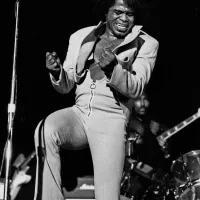
James Brown an iconic American singer songwriter dancer and musician...
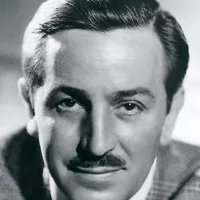
Walter Elias Disney was a highly influential American animator film...
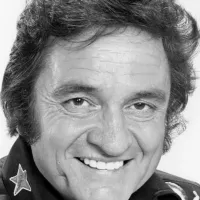
Johnny Cash the Man in Black was a highly influential...
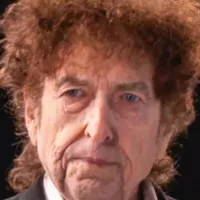
Bob Dylan is a highly influential American singer-songwriter renowned as...
Trending
7 months ago American hiker Cole Henderson found dead in Spanish Pyrenees after going missing.

4 months ago Cowboys Rumored to Target Maxx Crosby in Potential Trade with Raiders.

51 minutes ago Elisabeth Hasselbeck Returns to 'The View', Receives 'Armor of God' Gift
2 hours ago Republicans Pressure Trump Over UK's Diego Garcia Plan; Starmer Faces Legal Challenge

3 hours ago Jamie Lee Curtis' 'Blue Steel' finds streaming success; Curtis guests on podcast

3 hours ago Wagner Moura's Film 'Uma Batalha Após a Outra' Wins PGA Award, Oscar buzz.
Popular

Jesse Jackson is an American civil rights activist politician and...

Hillary Diane Rodham Clinton is a prominent American politician lawyer...

Jim Carrey is a Canadian-American actor and comedian celebrated for...

XXXTentacion born Jahseh Dwayne Ricardo Onfroy was a controversial yet...

Kashyap Pramod Patel is an American lawyer who became the...

Michael Joseph Jackson the King of Pop was a highly...
